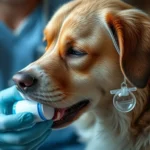
Introduction
Dental health is a crucial aspect of overall well-being for dogs, and dachshunds are no exception. As a breed, dachshunds are prone to various teeth problems due to their unique dental structure and size. Understanding these issues can help owners take proactive steps to maintain their pet’s dental health. This article aims to educate dachshund owners about common dental problems, the importance of regular dental care, and effective solutions to keep their furry friends smiling.
Understanding Dachshund Dental Anatomy
Unique Dental Structure of Dachshunds
Dachshunds have a distinctive dental anatomy that sets them apart from many other breeds. With a long body and shorter legs, their jaws are also proportionate, making them more susceptible to dental issues. Typically, a dachshund has 42 teeth, which include incisors, canines, premolars, and molars.
Compared to larger breeds, dachshunds have smaller mouths that can lead to crowding of teeth, making it easier for plaque and tartar to build up. This unique arrangement can result in more significant dental challenges as they age.
Common Dental Terminology
Understanding dental terminology is essential for dog owners. Here are some key terms to familiarize yourself with:
- Plaque: A sticky film of bacteria that forms on teeth.
- Tartar: Hardened plaque that can lead to gum disease.
- Gingivitis: Inflammation of the gums, often the first stage of periodontal disease.
- Periodontal disease: A serious gum infection that can lead to tooth loss and other health issues.
Recognizing these terms can help owners communicate effectively with their veterinarians and understand their dachshund’s dental health.
Common Dachshund Teeth Problems
Periodontal Disease
Periodontal disease is one of the most common dental problems in dachshunds. It begins with plaque buildup, which can harden into tartar if not removed. This condition can progress through several stages:
- Gingivitis: Early signs include red, swollen gums. If caught early, gingivitis can often be reversed with proper dental care.
- Mild Periodontitis: As the disease progresses, pockets form between the teeth and gums, leading to further inflammation and infection.
- Severe Periodontitis: Advanced stages can result in tooth loss and systemic health issues due to bacteria entering the bloodstream.
Symptoms of periodontal disease in dachshunds may include bad breath, difficulty chewing, and changes in eating habits.
Tooth Decay and Cavities
Tooth decay and cavities are less common in dogs than in humans but can still occur, especially in dachshunds. Causes of tooth decay often relate to poor dental hygiene, diet, and genetics. Signs to look out for include:
- Visible holes or dark spots on the teeth
- Increased sensitivity while eating
- Excessive drooling or difficulty chewing
Malocclusion
Malocclusion refers to misaligned teeth or jaws. In dachshunds, this can lead to improper chewing and increased wear on specific teeth, potentially resulting in pain or tooth loss. Owners may notice their dachshund favoring one side while chewing or avoiding certain types of food.
Retained Baby Teeth
Dachshunds can experience retained baby teeth, where the primary teeth do not fall out as the adult teeth emerge. This condition often leads to crowding, misalignment, and increased risk of periodontal disease. If you notice that your dachshund still has baby teeth after six months, consult your veterinarian.
Bad Breath (Halitosis)
While bad breath is common in dogs, persistent halitosis can indicate underlying dental issues. Common causes include:
- Accumulation of plaque and tartar
- Gum disease
- Tooth decay
If your dachshund’s bad breath is accompanied by other symptoms, such as swollen gums or changes in eating habits, it is time to consult a vet.
Identifying Dental Problems in Dachshunds
Visual Signs of Dental Issues
Regularly examining your dachshund’s mouth is vital for early detection of dental issues. Key indicators include:
- Swollen or red gums
- Discoloration of teeth (yellow or brown spots)
- Loose or missing teeth
A healthy mouth should have pink gums and white teeth, so any deviations from this should prompt a visit to the vet.
Behavioral Signs
Behavioral changes can also indicate dental problems. Watch for signs such as:
- Reluctance to eat or chew
- Whining or discomfort when touching the mouth
- Excessive drooling or pawing at the mouth
These behaviors can suggest pain or discomfort that warrants further investigation.
Regular Dental Check-ups
Regular veterinary check-ups are crucial for maintaining your dachshund’s dental health. It is generally recommended that dogs have dental exams at least once a year. However, dachshunds may require more frequent visits due to their predisposition to dental issues.
Prevention and Care for Dachshund Teeth
Dental Hygiene Routine
Establishing a dental hygiene routine is vital for preventing dachshund teeth problems. Here’s a step-by-step guide to brushing your dachshund’s teeth:
- Get the Right Tools: Use a toothbrush designed for dogs and pet-safe toothpaste.
- Introduce Gradually: Allow your dog to sniff and taste the toothpaste before brushing.
- Start Slow: Begin by brushing a couple of teeth at a time, gradually increasing the number.
- Be Gentle: Focus on the gum line where plaque accumulates.
Aim to brush your dachshund’s teeth at least two to three times a week.
Diet and Nutrition
A balanced diet plays a significant role in dental health. Look for high-quality dog foods that contain dental health-promoting ingredients. Foods that are hard and crunchy can help reduce plaque buildup. Avoid sugary treats, as they can contribute to tooth decay.
Chewing Products and Toys
Providing your dachshund with the right chew toys can promote dental health. Look for:
- Rubber Chew Toys: Durable options that can withstand aggressive chewing.
- Dental Chews: Specially designed treats that help clean teeth while being chewed.
Professional Dental Cleanings
Professional dental cleanings performed by a veterinarian are essential for maintaining dental health. These cleanings typically involve:
- Scaling to remove tartar
- Polishing the teeth
- A thorough examination for any underlying issues
These cleanings should be performed annually or as recommended by your veterinarian.
Treatment Options for Dachshund Teeth Problems
Home Remedies
While serious dental issues require veterinary intervention, some minor problems can be addressed at home. Safe home remedies include:
- Offering raw veggies like carrots for natural teeth cleaning.
- Using dental wipes designed for dogs to help remove plaque.
Veterinary Treatments
For more serious dental issues, your veterinarian may recommend treatments such as:
- Tooth Extraction: Necessary for severely decayed or damaged teeth.
- Scaling: A professional cleaning to remove tartar build-up.
Discuss all available treatment options with your vet to determine the best course of action for your dachshund.
Post-Treatment Care
After dental procedures, monitor your dachshund for signs of complications, such as:
- Excessive bleeding or swelling
- Difficulty eating or drinking
- Changes in behavior (e.g., lethargy)
Follow your veterinarian’s aftercare instructions to ensure a smooth recovery.
Frequently Asked Questions (FAQs)
How often should I brush my dachshund’s teeth?
Ideally, you should brush your dachshund’s teeth at least two to three times per week. Daily brushing is even better for optimal dental health.
What are the signs of dental pain in dogs?
Signs of dental pain may include reluctance to eat, whining or growling when the mouth is touched, excessive drooling, and pawing at the mouth.
Is dental cleaning under anesthesia safe for dachshunds?
While any anesthesia carries some risks, professional dental cleanings are generally safe. Your veterinarian will conduct a thorough health assessment before recommending anesthesia.
Can dental problems lead to other health issues?
Yes, untreated dental problems can lead to systemic health issues, including heart disease, liver disease, and kidney problems due to bacteria entering the bloodstream.
What is the lifespan of dachshund teeth?
With proper dental care, dachshund teeth can last a lifetime. Regular dental hygiene significantly contributes to the longevity of their teeth.
Conclusion
Maintaining dental health is vital for the overall well-being of your dachshund. By understanding the common dachshund teeth problems and implementing a proactive dental care routine, you can help prevent serious health issues. Regular vet check-ups, consistent dental hygiene, and a balanced diet will go a long way in keeping your dachshund’s teeth healthy and strong. Don’t hesitate to reach out to your veterinarian if you have any concerns about your dog’s dental health.









